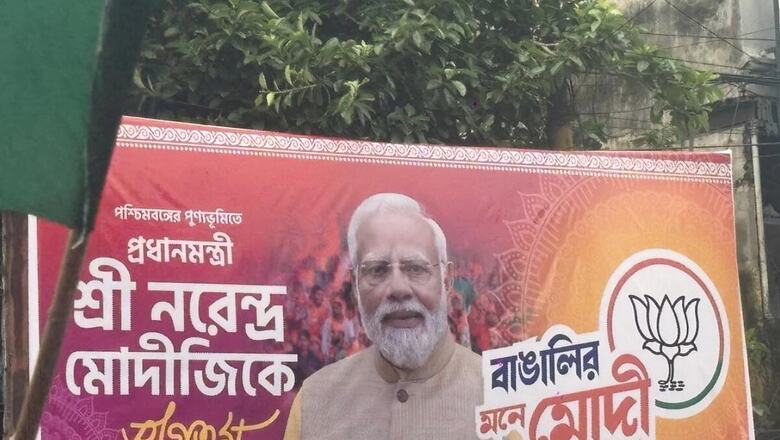
views
Prime Minister Narendra Modi has just completed his first hundred days in office in his third term. As the only Prime Minister to be re-elected for an uninterrupted third term since Jawaharlal Nehru, Modi has indeed etched his tenure and name and that of his party’s in the history of independent India, as a historical and epochal watershed that has and continues to impart a decisively new direction to the country. In the last decade India’s emergence as a major and credible power, a power capable of holding its ground and striving for its interests has been amply proved. Despite many-sided attempts to retard India’s rise, Modi has withstood and ultimately triumphed.
Those within India and outside, who strove hard to weaken Modi were dejected to see the results of the general elections in June 2024. In spite of their coordinated machinations through a well-oiled eco-system, Modi won. Since they were dejected and disgusted with his victory, they resorted to describing an imaginary stoop in Modi’s gait and demeanour. That imagination has now become their only solace, the balm meant to heal their wounds of disappointment at not being able to prevent Modi from taking oath and leading his government for a record third time.
In a moving study of Netaji Subhas Chandra Bose in Bengali, ‘Deshnayak Subhas Chandra’, eminent historian of Bengal’s re-awakening and noted éducateur late Nemai Sadhan Basu, wrote of how all those who worked with Subhas Chandra, his colleagues in the freedom struggle and in the INA, were unanimous in their assessment of Netaji having generated in them a deep and indelible pride of being Indian. That sense and that pride, once faced with dilution, has, in the last one decade under PM Modi, been reinforced and reiterated. It has struck deeper roots and evoked a more solid and lasting conviction. Those opposing Modi and wanting to defeat him have a deep problem with and resentment towards that sense of pride of being Indian being rekindled and revivified among Indians.
Between their efforts to implement their deconstructing India agenda, stands Modi and that rankles and irritates them. They resort to the propaganda of a broken-Modi-stooping. But it is evident, they know it and it is there for people to understand, that the propaganda is a means for consoling themselves for having failed to unseat and defeat Modi. For two decades and more, these forces have tried and continue to try to target him. However, for the last two decades they have also repeatedly tasted failure.
In the series of many assessments of Prime Minister Narendra Modi’s decadal tenure, I propose to add a brief one myself. I write this as a Bengali, as someone who is concerned with and exercised about Bengai’s cultural essence and ethos, about the re-awakening in her to the sense and memory of her epic contribution to the creation and to the shaping of India’s civilisational narrative. I am also among numerous others, who strongly feel that Bengal’s icons and their legacies need to be disseminated in order to rebuild a wider foundational base for the rejuvenation and rise of the state as a leading constituent of the Indian Union. In the past one decade PM Modi’s contribution to this rejuvenation has been phenomenal and inspiring. He has done this for other states without exception, exuding in his action a deep essence and core which is committed to India’s fundamental unity. For West Bengal he has especially done it, despite facing criticism and derision from certain quarters of the ruling establishment in the state. Let me briefly enumerate his contribution.
Among the many centres of emotion and identity in Bengal some always stand out and have a deep connection and bond with the people. Durga Puja, Gurudev Rabindranath Tagore’s life and legacy of Netaji Subhas Chandra Bose, are integral to Bengal’s psyche and imagination. PM Modi has indefatigably striven to further uphold these legacies.
The recognition of Durga Puja by UNESCO as an intangible cultural heritage of humanity, the first such a festival to make it to the list from Asia, was a historic and emotional moment for Bengal. It was a ‘matter of great pride and joy for every Indian’, PM Modi said, observing that Durga Puja symbolized the ‘best of our traditions and ethos.’ It was a long and arduous wait. PM Modi’s cabinet colleagues, under his active direction, and their respective ministries kept up the pursuit till success was achieved. PM Modi was also the first Prime Minister to inaugurate a Durga Puja and to dwell on its symbolism, significance and centrality in the ethos of Bengal and of India. It was a turning point in the cultural and religious history of Bengal and Bengalis, a milestone which will define the future of the religious festival and will eventually accrue benefit to innumerable people who subsist on the Durga Puja eco-system. Besides touching an emotional chord, the global attention on Durga Puja will invariably bring with it, in the decades to come, a host of positive opportunities and scope for the state.
The UNESCO recognition of Santiniketan, Gurudev Rabindranath Tagore’s creation, his seat of meditation, a place embodying his life’s message, struggles, aspirations and achievements, was another watershed contribution that PM Modi made to the cultural ethos of Bengal. This recognition for Santiniketan and its ideals was long in coming. No Prime Minister before Narendra Modi actively attempted to get such a global recognition conferred on Santiniketan. The recognition had a deep pathos and poignancy especially when one recalls Gurudev’s words likening his institution and ashrama, to a ‘vessel carrying the cargo’ of his ‘life’s best treasure’, hoping that ‘it may claim special care’ from his ‘countrymen for its preservation.’ The UNESCO recognition was a profoundly symbolic fulfillment of that hope. Santiniketan, for Gurudev was a nest where the world would meet, by ensuring that UNESCO conferred the heritage tag on it PM Modi imparted a moving historical recognition to Gurudev’s mantra and hope. Almost every Bengali continues to thrill to Gurudev’s legacy and to his Santiniketan; the UNESCO heritage tag thus was a moment of unalloyed happiness at the recognition of Gurudev’s life’s best treasure. It also reinforced Bengal’s cultural pride.
Prime Minister Modi’s continuing tribute to Netaji Subhas Chandra Bose’s legacy and contribution has been among his most moving and historic contributions to legacy of the freedom struggle in Bengal and India. Subhas Bose stands as an undiminished icon, his continued relevance and appeal across ages and generations have remained undiluted even over seven decades after independence. The emotions and reactions he continues to evoke in West Bengal and among Bengalis, particularly, is instant and intense.
The installation of Netaji’s statue in ‘Kartavya Path’, in Delhi, instituting, for the first time ever, a national award in Netaji’s name, ‘Subhash Chandra Bose Aapda Prabandhan Puraskar’, (Subhas Chandra Bose national award for disaster management), the renaming of islands in Andaman & Nicobar after Netaji Subhas Chandra Bose, the declassification of files pertaining to his life and the setting up of special exhibitions commemorating his contributions and that of the INA are among the many unique contributions that PM Modi has made in order to reinstate that multifaceted and inspiring legacy.
While others paid lip service to this need, obfuscated and avoided it, hardly did anything lasting in keeping Netaji’s legacy re-ignited in the national mind, PM Modi went ahead and responded to a long held wish and hope among people. In paying his many-sided tribute to Netaji, in publicly referring to him as ‘Azad Hind’s’ first Prime Minister, PM Modi struck a deep chord in the psyche of Bengal. He did what no other Prime Minister did when it came to Netaji’s legacy.
The abrogation of Article 370 was one of the finest memorial and tribute to that another illustrious son of Bengal and of India, Dr Syama Prasad Mookerjee. The only national leader of stature and recognition to have sacrificed his life for the cause of abrogating Article 370, and the call for protecting and securing India’s unity and freedom, Dr Mookerjee plunged into the movement without prevaricating. The preservation of India’s unity and the conferring of constitutional rights equally on all citizens of India were paramount for him. By rendering of Article 370 obsolete, by ensuring that the writ of the Constitution of India was equally applicable to Jammu and Kashmir, by giving the marginalised a hope for a new life and by making sure that the march of development saw a heightened progress in the region PM Modi has paid a solid tribute to Dr Mookerjee’s life, legacy and sacrifice.
The realisation of the vision and hope of one nation, one constitution is an indelible and ineradicable recognition of Dr Mookerjee’s contribution to the polity of free India. A physical edifice to him, as memorial, with the continued existence of Article 370 would have been a travesty. PM Modi pushed through this historic dissolution and ushered in a historic era of opportunity, of new possibilities and of growth and stability. It also allowed democracy from the grassroots upward to finally strike roots in the region.
On a concluding note, the National Education Policy (NEP), a new education vision and creative framework for a 21st century India, is a fitting tribute to the legacy of the national education movement, which was centered on Bengal during the heydays of the Swadeshi movement. That movement had, as its fountain and leaders, the likes of Swami Vivekananda, Bankim Chandra Chattopadhyay, Sri Aurobindo, Bipin Chandra Pal and Gurudev Rabindranath Tagore, to name some of its leading lights. The NEP is a tribute, a culmination to all our educational thinkers, philosophers and visionaries. It is a tribute to their contemplation and hopes of a free India emerging once more as a centre of knowledge and of learning.
More importantly the NEP is one of the greatest tributes to the seers from Bengal, especially Swami Vivekananda, Sri Aurobindo and Tagore. A close look at the NEP will reveal that the schema has as its core the essence of the educational thought and vision of these thinkers and creators. That some of Bengal’s and of India’s greatest educational thinkers form the bedrock of inspiration for this document is a lasting tribute to that dimension of their life and action. The NEP’s creation and launch was because of PM Modi’s ceaseless exhortation, despite the onslaught of the once in a century pandemic.
As a Bengali, and as an Indian, I rejoice at these achievements of PM Modi. As a Bengali, I doubly rejoice that each of these actions of his is also a tribute to Bengal, to Bengal’s cultural and religious essence, her rich tradition of knowledge and of sacrifice, a commemoration of her contribution to freeing India, to her cultural self-recovery and awakening. I rejoice at the fact that PM Modi is the first Prime Minister to do these, none before him contemplated doing these, none before him thought of Bengal in the way he has done. His actions have repeatedly displayed empathy, recognition, concern and sensitiveness for Bengal’s legacy.
The author is Chairman, Dr Syama Prasad Mookerjee Research Foundation and member, National Executive Committee, BJP. The views expressed in the above piece are personal and solely those of the author. They do not necessarily reflect News18’s views.




















Comments
0 comment